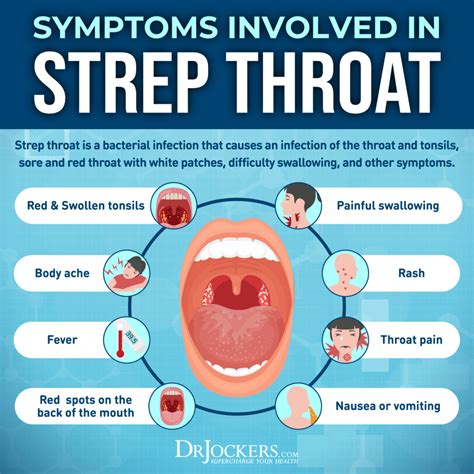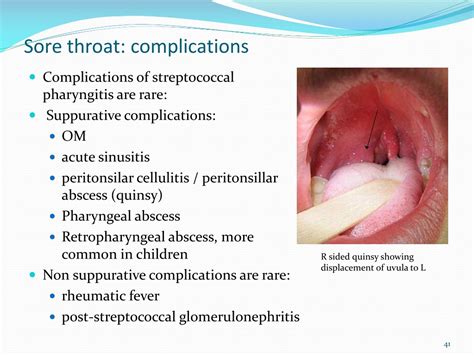Intro
Identify strep throat symptoms with 5 key signs, including sore throat, fever, and swollen tonsils, to determine if you need medical attention for this contagious bacterial infection.
Strep throat, also known as streptococcal pharyngitis, is a common and highly contagious infection that affects the throat and tonsils. It is caused by the Group A Streptococcus bacterium and can spread through close contact with an infected person, contaminated food and drinks, or touching surfaces that have the bacteria on them. Recognizing the signs and symptoms of strep throat is crucial for early diagnosis and treatment, which can help prevent complications and reduce the risk of transmission to others.
The symptoms of strep throat can vary from person to person, but there are some common signs that indicate the presence of this infection. If you or someone you know is experiencing a severe sore throat, it is essential to pay attention to other symptoms that may accompany it. A timely diagnosis and proper treatment can make a significant difference in the recovery process and prevent potential complications.
Strep throat can affect anyone, but it is most common in children and adolescents. The infection can spread quickly in schools, childcare centers, and other crowded areas, making it essential for parents, caregivers, and individuals to be aware of the signs and symptoms. By recognizing the early warning signs of strep throat, you can take prompt action to consult a healthcare professional and prevent the infection from spreading to others.
Introduction to Strep Throat

Strep throat is a bacterial infection that requires medical attention. If left untreated, it can lead to complications such as kidney inflammation, rheumatic fever, and abscesses in the throat. The good news is that strep throat can be treated effectively with antibiotics, which can help alleviate symptoms, reduce the risk of transmission, and prevent potential complications.
5 Common Signs of Strep Throat

The following are five common signs of strep throat that you should be aware of:
- Sudden and severe sore throat
- White or yellow patches on the tonsils
- Swollen and tender lymph nodes in the neck
- Fever, usually above 101°F (38.3°C)
- Headache and stomachache
Understanding the Symptoms
Each of these symptoms can indicate the presence of strep throat, but it is essential to consult a healthcare professional for an accurate diagnosis. A physical examination, medical history, and laboratory tests such as a rapid strep test or throat culture can help confirm the presence of the infection.Causes and Risk Factors

Strep throat is caused by the Group A Streptococcus bacterium, which can spread through:
- Close contact with an infected person
- Contaminated food and drinks
- Touching surfaces that have the bacteria on them
- Inhaling droplets that contain the bacteria
Certain risk factors can increase the likelihood of developing strep throat, including:
- Age: Strep throat is most common in children and adolescents
- Weakened immune system: Individuals with a weakened immune system are more susceptible to infections
- Close living quarters: People who live in close proximity to others, such as in schools, childcare centers, or military barracks, are more likely to contract the infection
Diagnosis and Treatment

A healthcare professional can diagnose strep throat using a combination of physical examination, medical history, and laboratory tests. The diagnosis is usually confirmed with a rapid strep test or throat culture, which can detect the presence of the Group A Streptococcus bacterium.
The treatment for strep throat typically involves a course of antibiotics, which can help alleviate symptoms, reduce the risk of transmission, and prevent potential complications. It is essential to complete the full course of antibiotics as prescribed by the healthcare professional, even if symptoms improve before finishing the medication.
Home Remedies and Self-Care
In addition to antibiotics, there are several home remedies and self-care strategies that can help alleviate symptoms and support recovery, including: * Staying hydrated by drinking plenty of fluids * Getting plenty of rest * Using a humidifier to add moisture to the air * Gargling with salt water to soothe the throat * Taking over-the-counter pain relievers to reduce fever and alleviate painPrevention and Transmission

Preventing the transmission of strep throat is crucial to reducing the risk of infection. The following strategies can help prevent the spread of the infection:
- Practicing good hygiene, such as washing hands frequently and thoroughly
- Avoiding close contact with individuals who have strep throat
- Not sharing food, drinks, or utensils with others
- Covering the mouth and nose when coughing or sneezing
- Staying home from school or work when symptoms appear
Complications and Long-Term Effects

If left untreated, strep throat can lead to complications such as:
- Kidney inflammation
- Rheumatic fever
- Abscesses in the throat
- Sinusitis
- Ear infections
It is essential to seek medical attention promptly if symptoms persist or worsen over time. A healthcare professional can diagnose and treat strep throat effectively, reducing the risk of complications and promoting a speedy recovery.
Conclusion and Next Steps

In conclusion, recognizing the signs and symptoms of strep throat is crucial for early diagnosis and treatment. By understanding the causes, risk factors, diagnosis, and treatment of strep throat, individuals can take prompt action to consult a healthcare professional and prevent the infection from spreading to others. If you or someone you know is experiencing symptoms of strep throat, do not hesitate to seek medical attention.
We invite you to share your thoughts and experiences with strep throat in the comments section below. Your feedback and insights can help others understand the importance of recognizing the signs and symptoms of this common and highly contagious infection.
What are the common symptoms of strep throat?
+The common symptoms of strep throat include sudden and severe sore throat, white or yellow patches on the tonsils, swollen and tender lymph nodes in the neck, fever, and headache.
How is strep throat diagnosed?
+Strep throat is diagnosed using a combination of physical examination, medical history, and laboratory tests, such as a rapid strep test or throat culture.
Can strep throat be treated with antibiotics?
+Yes, strep throat can be treated with antibiotics, which can help alleviate symptoms, reduce the risk of transmission, and prevent potential complications.
How can I prevent the transmission of strep throat?
+You can prevent the transmission of strep throat by practicing good hygiene, avoiding close contact with individuals who have strep throat, not sharing food or drinks with others, and covering your mouth and nose when coughing or sneezing.
What are the potential complications of untreated strep throat?
+Untreated strep throat can lead to complications such as kidney inflammation, rheumatic fever, abscesses in the throat, sinusitis, and ear infections.
